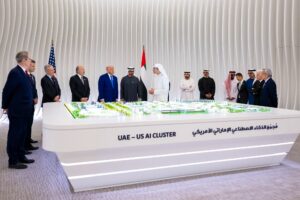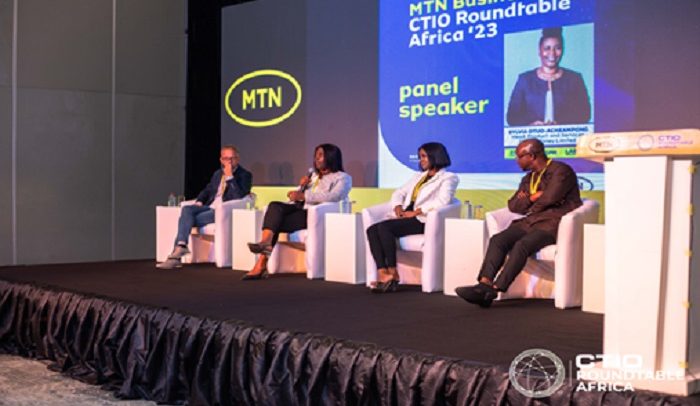
By Seade CAESAR
The world is witnessing a seismic shift in the geopolitical landscape of technology, with artificial intelligence (AI) emerging as the new frontier of global influence.
Central to this transformation is the strategic partnership between the United Arab Emirates (UAE) and the United States, which has rapidly evolved into a powerful AI alliance.
This collaboration is not merely about technology transfer; it represents a broader alignment of interests in innovation, economic diversification, and digital leadership.
During the recent 2025 visit of U.S. President Donald Trump to the Gulf region, the UAE and the US announced landmark AI initiatives, including multi-billion-dollar investments and the development of cutting-edge data centers.
These developments underscore the UAE’s ambition to become a global AI hub, supported by America’s technological prowess.
For African nations, particularly Ghana, this partnership offers a compelling signal: the future belongs to those who act now in embracing and investing in AI.
The UAE-US AI Partnership: Strategic Implications
The UAE-US AI partnership represents a strategic realignment of global tech power, with deep implications for geopolitics, innovation, and economic diversification.
The UAE has emerged as a regional AI powerhouse by heavily investing in AI research, infrastructure, and high-performance data centers.
This includes partnerships with US tech giants such as Open AI, Microsoft, and Nvidia to develop projects like the massive “Stargate UAE” supercomputer hub.
The collaboration allows the UAE to benefit from American AI chip technology and software, while the US secures a reliable partner in a region increasingly influenced by China’s digital rise.
The deal also enables both nations to shape global norms around AI development and deployment. Crucially, it signals a shift from traditional oil-based diplomacy to digital and knowledge-based cooperation.
This new axis of innovation creates a model for other emerging economies, especially in Africa, to align with similar partnerships for rapid AI advancement and socio-economic transformation.
G42 to lead a consortium with US partners to build 5GW UAE-US AI Campus
Abu Dhabi-based technology firm G42 is spearheading the development of a monumental 5-gigawatt AI data center campus in partnership with leading U.S. technology companies.
This initiative, known as the UAE–U.S. AI Campus, is poised to become the largest AI infrastructure project outside the United States

Key Highlights of the UAE–U.S. AI Campus
Scale and Capacity: The campus will span 10 square miles in Abu Dhabi and is designed to deliver 5 gigawatts of AI-grade computing power.The first phase, a 1-gigawatt cluster named Stargate UAE, is expected to commence operations in 2026 with an initial deployment of 200 megawatts.
Consortium Partners: G42 leads the project alongside U.S. tech giants including OpenAI, Oracle, NVIDIA, Cisco, and SoftBank Group.Open AI and Oracle will oversee operations, while NVIDIA will supply its advanced Grace Blackwell GB300 AI systems.
Strategic Framework: The project is part of the newly established U.S.-UAE AI Acceleration Partnership, aiming to deepen bilateral cooperation in AI and advanced technologies.This framework emphasizes secure and responsible AI development.
Sustainable Infrastructure: The facility will utilize a mix of nuclear, solar, and natural gas energy sources to minimize carbon emissions.Additionally, it will house a science park dedicated to innovation, talent development, and sustainable computing infrastructure.
Global Impact: The campus aims to provide sovereign, AI-grade compute at scale, supporting regional innovation and serving nearly half the world’s population within a 3,200 km radius of the UAE.
This ambitious project underscores the UAE’s commitment to becoming a global leader in artificial intelligence (AI) and reflects the strengthening technological ties between the UAE and the United States.
UAE – US AI Focus
Strategic Investment
The UAE is leveraging its sovereign wealth funds, such as Mubadala and ADQ, to channel billions into AI-focused startups, research hubs, and data infrastructure. Partnering with U.S. tech giants and venture capital firms, these investments aim to build a robust transnational AI ecosystem, creating long-term economic and technological dividends.
Research Exchange
The partnership fosters academic collaboration between leading U.S. institutions like MIT and Stanford and UAE-based research centers such as the Mohamed bin Zayed University of Artificial Intelligence (MBZUAI). These exchanges aim to co-develop AI solutions, promote knowledge transfer, and cultivate a global pipeline of researchers and PhD-level talent.
Regulatory Alignment
Both countries are working toward harmonizing AI governance frameworks, focusing on ethical AI, privacy standards, and algorithmic transparency. This alignment facilitates cross-border innovation while minimizing regulatory friction, ensuring that AI technologies developed and deployed under this partnership adhere to globally accepted norms and principles of responsible AI usage.
Tech Diplomacy
The UAE-US alliance frames AI as a vehicle for global good, emphasizing cooperation over competition. By embedding AI into broader diplomatic relations, both countries seek to shape international AI norms, promote peace, and use emerging technologies to tackle global challenges such as climate change, health crises, and food insecurity.
What This Means for Africa
Africa, home to the youngest population and one of the fastest-growing digital economies, cannot afford to lag behind. The UAE-US partnership sends a clear message to African policymakers and private-sector leaders: the time to invest in AI is now. Here’s why:
Global Geopolitical Shifts Favor AI-Capable Nations
Artificial Intelligence is becoming a core driver of economic and geopolitical influence. Countries that master AI technologies will set global standards, shape international norms, and dominate innovation ecosystems. Africa must invest strategically now to avoid marginalization and instead position itself as a competitive force in shaping the digital future
The Gulf is Looking South
The UAE and other Gulf nations are increasingly investing in Africa’s infrastructure, agriculture, and fintech sectors. These partnerships can now expand to include AI-focused collaborations. Africa can leverage Gulf capital, experience, and tech infrastructure to accelerate its own AI development, while providing market access and talent in return.
Africa’s Comparative Advantage
Africa offers unique conditions for AI experimentation: large, youthful populations, under-digitized sectors, and rich cultural and linguistic diversity. These conditions create a high-impact environment for deploying AI solutions in real-world development challenges. Local data and contextual relevance make Africa ideal for training ethical, inclusive, and sustainable AI systems.
Rise of South-South Cooperation
As developing nations seek alternatives to Western-dominated tech ecosystems, South-South partnerships are gaining traction. Africa and the Gulf share similar development priorities and non-aligned diplomacy. AI collaboration under this model promotes equity, shared growth, and mutual technological empowerment free from dependency on traditional tech powerhouses or restrictive geopolitical dynamics.
Why Ghana must lead
Among African nations, Ghana stands out as uniquely positioned to champion AI on the continent. Here’s why:
Strong Democratic and Institutional Foundations
Ghana’s democratic governance, peaceful transitions of power, and robust legal frameworks make it a reliable environment for technology investment. Stable institutions enhance investor confidence and provide a solid foundation for the rule of law an essential prerequisite for data protection, cybersecurity, and ethical AI governance.
Ghana’s commitment to transparency, good governance, and accountability enables the effective implementation of national AI strategies and fosters public trust in new technologies. This institutional maturity positions Ghana to become a regional AI innovation hub.
Growing Tech Ecosystem
Ghana’s technology ecosystem is flourishing, with Accra emerging as a startup hub in West Africa. The country’s vibrant community of developers, tech incubators, and innovation hubs such as MEST Africa and Impact Hub demonstrate strong entrepreneurial momentum.
Digital finance, healthtech, and agritech startups are already integrating AI tools to solve local challenges. With appropriate investment, this ecosystem can evolve into a continental AI powerhouse, generating homegrown solutions while attracting foreign partnerships from entities like the UAE tech firms.
Educational and Research Potential
Ghana boasts a network of universities and research institutions capable of fostering AI education and innovation. Institutions such as the University of Ghana, KNUST, and Ashesi University are producing graduates in data science, software engineering, and robotics.
By integrating AI-focused courses and research labs into existing curricula, Ghana can cultivate a new generation of AI professionals. Collaboration with Gulf and Western universities could enhance capacity building, enabling Ghana to lead African AI research and contribute meaningfully to global AI conversations.
Policy Readiness
Ghana is ahead of many African peers in terms of digital governance. Through initiatives like the Ghana Digital Agenda and Data Protection Act, the country has laid the groundwork for responsible data and tech governance.
These policy frameworks can be extended to guide AI deployment, focusing on inclusivity, transparency, and ethical use. With the right political will, Ghana could swiftly craft a National AI Strategy, establishing it as a leader in AI policy development and governance across the African continent.
Strategic Recommendations for Ghana and Africa
To seize the momentum created by the UAE-US AI alliance, Ghana and other African nations must take the following steps:
Develop National AI Strategies
Ghana must prioritize the creation of a comprehensive National Artificial Intelligence Strategy. This should outline the country’s long-term vision, ethical AI frameworks, investment policies, and sector-specific implementation plans in key areas such as agriculture, healthcare, education, and finance.
The strategy must be multi-stakeholder, involving government, academia, private sector, and civil society. It should ensure data protection, algorithmic transparency, and inclusivity. With a clear roadmap, Ghana can attract global partnerships, guide local innovation, and become a continental leader in AI governance and deployment.
Forge Gulf-Africa AI Partnerships
Ghana should proactively initiate bilateral and multilateral partnerships with leading AI institutions in the Gulf, such as the Mohamed bin Zayed University of Artificial Intelligence and the Technology Innovation Institute in Abu Dhabi.
These partnerships can facilitate joint research, faculty and student exchanges, co-development of AI applications, and access to funding and high-performance computing infrastructure. Strategic diplomatic engagement with the UAE will position Ghana as a gateway for AI collaboration between Africa and the Gulf, aligning with South-South cooperation principles for shared prosperity.
Mobilize Private Sector Investment
To fuel a thriving AI ecosystem, Ghana must encourage its private sector especially in fintech, healthtech, agri-tech, and logistics to adopt AI-driven solutions.
This requires government-backed incentives such as tax reliefs, research grants, and innovation hubs. Equally important is fostering investor confidence through startup-friendly regulations and public-private dialogues.
Ghanaian startups should be supported to pitch to Gulf-based sovereign wealth funds and venture capitalists, positioning AI as a growth catalyst. By bridging innovation with investment, Ghana can unlock economic transformation powered by intelligent technologies.
Invest in Human Capital
A sustainable AI future depends on a well-equipped workforce. Ghana must invest in STEM education, digital literacy, and AI-specific training from the basic to tertiary level. This involves updating school curricula, introducing AI research centers, and offering scholarships in data science, machine learning, and robotics.
Collaborations with global tech companies and Gulf institutions can provide technical mentorship and capacity building. Special attention should be paid to gender and geographic equity to ensure inclusive access to AI education and reduce the digital divide across the country.
Create a Pan-African AI Alliance
Ghana should champion the formation of a Pan-African AI Alliance to coordinate AI research, data-sharing standards, and innovation across the continent. This alliance would foster collaboration between African universities, tech startups, and governments to co-develop solutions tailored to African contexts.
It would also advocate for continental data governance frameworks and ethical AI use. Ghana’s leadership in this space can enhance regional integration, attract international partnerships, and ensure that Africa speaks with one voice in global AI diplomacy and standard-setting fora.
Conclusion
The UAE-US AI partnership is more than a bilateral agreement, it is a geopolitical signal that AI will define the 21st-century global order.
For Africa, and Ghana in particular, this is a golden opportunity to position themselves as leaders not laggards in the Fourth Industrial Revolution. Ghana must not only follow the signal but also illuminate its own path, becoming a lighthouse for AI innovation across Africa.
Seade is the Executive Director,Africa Global Policy and Advisory Institute
The post Why UAE-US AI partnership is a greenlight to accelerate AI investment appeared first on The Business & Financial Times.
Read Full Story




















Facebook
Twitter
Pinterest
Instagram
Google+
YouTube
LinkedIn
RSS